- Kenmore refrigerator water filters
- Whirlpool refrigerator water filters
- Samsung refrigerator water filters
- GE refrigerator water filters
- LG refrigerator water filters
- Frigidaire refrigerator water filters
- KitchenAid refrigerator water filters
- Maytag refrigerator water filters
- Kenmore Elite refrigerator water filters
- Estate refrigerator water filters
- GE Profile refrigerator water filters
- Amana refrigerator water filters
- Bosch refrigerator water filters
- Dacor refrigerator water filters
- Electrolux refrigerator water filters
Can’t find your part? Contact us: +1-309-603-4777
Top DIY repair help
View All Repair Categories
Appliances
Lawn & Garden
Power Tools
Home Improvement
Sports & Leisure
Heating & Cooling
OrdersSchedule a repair
Keep track of the models you own in your profile
Sign in or Register to view or add models
Dryer: Why isn't my dryer getting my laundry dry?
It's not unusual for heavier items like jeans or towels to have a few damp patches when the drying cycle ends, especially in a mixed load of light and heavy fabrics. But if the whole load is still wet, you need to figure out why.
First, try these two simple fixes:
Use a lint brush to remove lint from the vent tube and exhaust duct. Lint cuts down the air flowing through the dryer, so clothes take longer to dry (lint is also a fire hazard).
If you use fabric softener, follow the steps in our video to remove fabric softener buildup on the dryer lint screen.
If your clothes are still coming out wet, check the dryer's heating system. A broken heater relay, failed timer, faulty operating thermostat, bad thermistor, blown thermal cut-off fuse or failed electronic control board can prevent an electric or gas dryer from heating.
Follow the tips in our troubleshooting video to determine why your electric dryer won't heat.
Follow the steps in our troubleshooting video to figure out why a gas dryer isn't heating. Besides the reasons listed above, the problem could be a blown thermal fuse, failed gas valve coils, a bad flame sensor or broken igniter.

THESE REPAIRS MAY HELP SOLVE YOUR DRYER PROBLEM
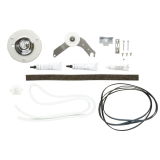
Regular dryer maintenance
Preventive maintenance for a dryer includes cleaning lint from the vent tube that runs from the dryer to the outdoors. Trapped lint can clog the vent, which creates a fire hazard and can increase drying times.
A clogged vent tube also can cause the dryer to overheat and trip the thermal fuse, causing the dryer to stop.
Check the power cord for damage and replace the cord if you see any break in the wiring insulation.
Clean the outside cabinet and the inside of the drum using a soapy washcloth. Wipe down the surfaces with plain water to remove soap residue.
Wash the lint screen with water and a soft-bristle brush to remove fabric softener residue following the instructions in this video.
Regular dryer maintenance
Find the required part specific to your product.
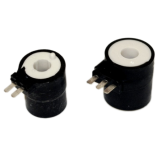
Replace the dryer gas valve coils
The gas burner assembly uses solenoid coils in a circuit with the flame sensor to safely ignite the burner. When the dryer starts a heated cycle, the circuit through those components is energized. The igniter glows until it reaches the proper temperature to ignite the gas, at which point the flame sensor trips open and the current flowing through that circuit is diverted to the gas valve coils so the gas valves open, and the burner lights and continues to burn. If the solenoid coils on the gas valves fail, the gas valves won't open for ignition. If the gas valve coils are weak, the burner lights during the initial ignition sequence from a cold start but it fails to light the burner on subsequent ignition attempts. In this situation, replace the valve coils.
Dryer gas valve coils
Find the required part specific to your product.
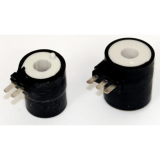
How to install a dryer gas valve coil kit
When a gas dryer starts to heat and then stops, the gas valve coils might be the problem. This repair guide and video show how to replace the dryer gas valve coils.
Repair difficulty
Time required
90 minutes or less
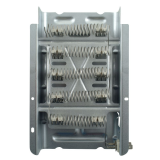
Replace the dryer heating element
The heating element generates the heat needed to dry garments. If the dryer is not heating, check the element for visible damage and replace the heating element if it's broken. Almost all electric heating elements require 240 volts to function correctly; if the heating element won't heat even though it's getting the 240-volt power, replace it even if it doesn't look broken.
Dryer heating element
Find the required part specific to your product.
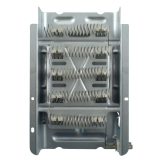
How to replace a heating element in an electric dryer
An electric dryer that won't heat might have a broken heating element. This dryer heating element repair guide and video show how to replace the electric heating element in less than 30 minutes.
Repair difficulty
Time required
15 minutes or less
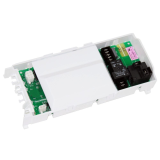
Repair or replace the dryer electronic control board
The electronic control board governs the timing and execution of dryer functions. The wiring connections on the control board can be repaired, but the control board itself cannot. Replace the electronic control board if it's receiving voltage but isn't transmitting it to the dryer components, causing the dryer to not work. The dryer may start but then stop in the middle of the cycle if internal control board components don't detect sensor signals accurately. It can be difficult to determine if the electronic control board is the problem (unless you see burn marks on it) and it's an expensive part that can't be returned once installed; for that reason, have a trained service technician perform advanced diagnostics on control board before you replace it.
Repair or replace the dryer electronic control board
Find the required part specific to your product.
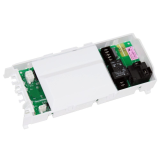
How to replace an electronic control board in a gas dryer
A dryer's electronic control board manages the dryer's operations, including drying time and temperature. If you or a service technician determine that the dryer electronic control board has failed, follow the steps in this repair guide and video to replace it.
Repair difficulty
Time required
45 minutes or less
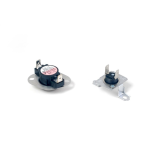
Replace the dryer thermal cut-off fuse
The thermal cut-off fuse is a safety device that shuts down the heat source if the dryer severely overheats. The dryer severely overheats if the high-limit thermostat didn't shut off the dryer when the heat source began overheating. You can't reset the thermal cut-off fuse--you must replace it, as well as the failed high-limit thermostat. The thermal cut-off fuse kit contains both components.
Dryer thermal cut-off fuse
Find the required part specific to your product.
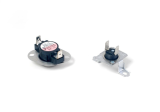
How to install a thermal cut-off fuse kit in an electric dryer
Does your electric dryer start but not heat? The thermal cut-off fuse might have blown because the high-limit thermostat failed. This repair guide and video show how to replace the thermal cut-off fuse and thermostat, which are available as kit.
Repair difficulty
Time required
15 minutes or less
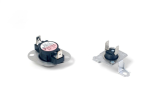
How to install a thermal cut-off fuse kit in a gas dryer
If your gas dryer isn't heating, it could be the thermal cut-off fuse blew when the high-limit thermostat broke. The repair guide and video show how to replace both—they're sold as a kit—in less than 30 minutes.
Repair difficulty
Time required
15 minutes or less
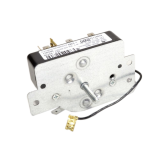
Replace the dryer timer
The timer on the control panel lets you set the drying time by turning the timer's control knob. A small motor on the back of the timer advances the timer during the cycle. The timer's internal cams open and close switches or contacts to operate the various electro-mechanical components in the dryer (mainly the drive motor and the heating element). Replace the timer if the contacts aren't working, the dryer won't start, heat or continue running, or the timer won't advance.
Dryer timer
Find the required part specific to your product.
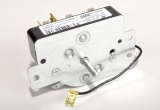
How to replace a dryer timer
If your dryer won't advance through the drying cycle, the timer might have failed. This step-by-step repair guide and video show how to replace a dryer timer in 30 minutes or less.
Repair difficulty
Time required
15 minutes or less
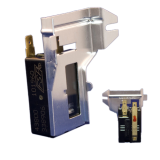
Replace the dryer flame sensor
The flame sensor detects when the igniter is hot enough to light the gas burner and trips to begin the ignition process in a gas dryer. If the flame sensor doesn't trip, then the burner won't light and the dryer won't heat. Replace the flame sensor if it doesn't trip when the igniter heats to ignition temperature.
Dryer flame sensor
Find the required part specific to your product.
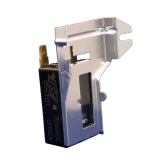
How to replace a flame sensor in a gas dryer
If your gas dryer won't heat, one possible cause is a faulty flame sensor. When the flame sensor fails, the burner won't light when the igniter gets hot. This repair guide and video show how to replace the flame sensor.
Repair difficulty
Time required
30 minutes or less
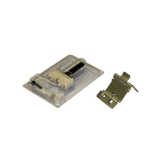
Replace the dryer igniter
The igniter glows white hot at the start of the burner ignition sequence. When it's hot enough to ignite gas, the flame sensor detects the temperature and opens electrically to divert current flow to the gas valve coils. The gas valves open, and the burner lights. If the igniter doesn't get hot enough to trigger the rest of the chain of events, replace the igniter.
Dryer igniter
Find the required part specific to your product.
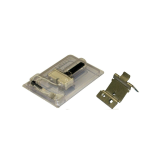
How to replace an igniter in a gas dryer
If your gas dryer won't heat because the burner won't light, it might mean the igniter has failed. This repair guide and video explain how to replace the gas dryer igniter easily.
Repair difficulty
Time required
60 minutes or less
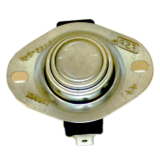
Replace the dryer operating thermostat
The operating thermostat — also called the cycling thermostat — senses the air temperature inside the dryer drum. It controls the heating element in an electric dryer and the burner in a gas dryer, turning that heat source on and off to maintain the temperature at about 150 degrees Fahrenheit for the Normal setting. If the thermostat fails, it won't control the heat source, in which case the dryer might not heat at all or it could overheat. If the operating thermostat is not regulating the dryer heat properly, replace it.
Dryer operating thermostat
Find the required part specific to your product.
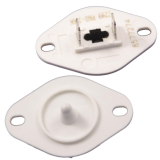
Replace the dryer thermistor
The thermistor is the dryer's temperature sensor, which is usually mounted on the blower housing. If it doesn't detect temperature properly, replace it. If it has a catastrophic failure and ceases working at all, the dryer usually displays a fault code.
Dryer thermistor
Find the required part specific to your product.
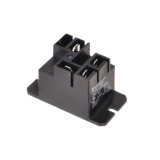
Replace the dryer heater relay
Some dryers have a heater relay that the electronic control board controls. The heater relay controls the heating element in an electric dryer and the gas burner assembly in a gas dryer. If the heater relay fails, the dryer runs but doesn't heat up.
Dryer heater relay
Find the required part specific to your product.
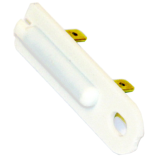
Replace the dryer thermal fuse
The thermal fuse is usually mounted on the blower fan housing. It detects the temperature of the air venting from the dryer to the outdoors and trips if the air becomes too hot. It typically trips if the vent tube is clogged or the exterior damper is closed. In an electric dryer, the thermal fuse shuts off the dryer when it trips. In a gas dryer, it prevents the dryer from heating, but the dryer still runs. The thermal fuse doesn't reset when the dryer cools and must be replaced if it trips.
Dryer thermal fuse
Find the required part specific to your product.
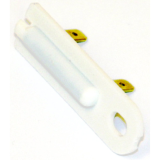
How to replace a thermal fuse in an electric dryer
If your electric dryer's won't start, but the control panel lights are working, it may be due to a blown thermal fuse. This DIY repair guide and video explain how to replace an electric dryer thermal fuse in 30 minutes or less.
Repair difficulty
Time required
15 minutes or less
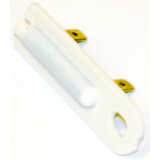
How to replace a thermal fuse in a gas dryer
Gas dryer not getting hot? The termal fuse might have blown. This repair guide and video show how to replace the gas dryer thermal fuse in 30 minutes.
Repair difficulty
Time required
15 minutes or less
Was this information helpful?
Most common symptoms to help you fix your dryers
Choose a symptom to see related dryer repairs.
Main causes: bad drum support roller, damaged idler pulley, broken blower fan blade, worn drum glide bearing, bad drive …
Main causes: bad gas valve coils, broken heating element, tripped safety thermostat or fuse, bad operating thermostat, c…
Main causes: damaged door strike, worn door catch…
Main causes: bad timer or electronic control board, door switch failure…
Main causes: lack of electrical power, bad power cord, wiring failure, bad control board, blown thermal fuse, bad door s…
Main causes: clogged exhaust vent, bad motor relay, loose dryer door catch, bad door switch, control system failure, fau…
Main causes: clogged exhaust system, heating system failure, deposits on moisture sensor, control system failure…
Main causes: door switch failure, lack of power, broken belt, blown thermal fuse, bad drive motor, control system failur…
Most common repair guides to help fix your dryers
These step-by-step repair guides will help you safely fix what’s broken on your dryer.
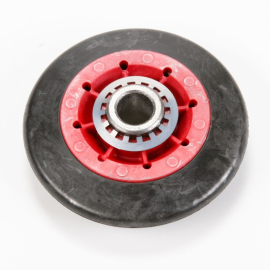
How to replace a dryer drum support roller
If your dryer thumps or squeals, replace the drum support roller to restore quiet to your home.…
Repair difficulty
Time required
90 minutes or less

How to replace a dryer thermistor
The thermistor senses the air temperature in the dryer. If your dryer overheats or doesn't heat at all, the thermistor …
Repair difficulty
Time required
30 minutes or less
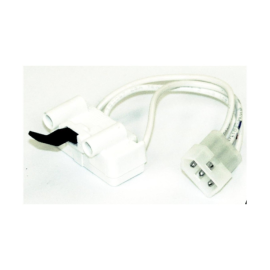
How to replace a dryer door switch
The dryer won't start if the door switch isn't working correctly. You can install a replacement dryer door switch in les…
Repair difficulty
Time required
15 minutes or less
Effective articles & videos to help repair your dryers
Use the advice and tips in these articles and videos to get the most out of your dryer.

Dryer surprise? From melted gum to rogue ink, here’s how to clean it up without damaging your drum or your next load.…

Learn about all the convenient features on our Sears PartsDirect website that make your parts purchases easier.…
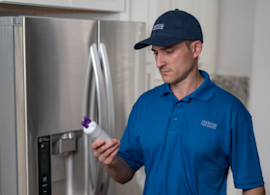
Get answers to frequently asked questions about Sears and Sears PartsDirect.…